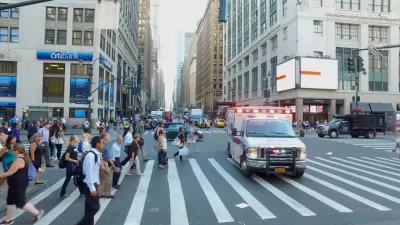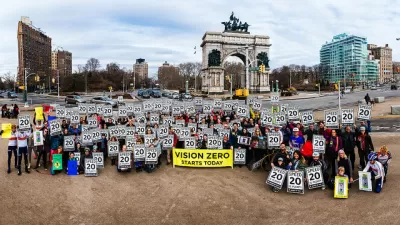Two new reports confirm the racial disparities of traffic violence in the United States, revealing more proof about who stayed home during the pandemic, and who was forced to navigate the risks of the pandemic in public.

We already know that U.S. traffic deaths soared during the pandemic, despite fewer people driving fewer miles. Now a new report adds another layer onto the tragic figures: Black Americans accounted for a disproportionate impact of traffic fatalities during the pandemic.
Reporting for CNN, Matt McFarland broke the news about a report published on June 3, 2021 by the U.S. Department of Transportation's National Highway Traffic Safety Administration.
The National Highway Traffic Safety Administration estimated earlier this month that 38,680 people died in motor vehicle crashes in 2020, the largest projected number of deaths since 2007, despite a 13.2% decrease in miles traveled from the prior year. When broken down along racial lines, white pedestrian deaths grew 4%, American Indian fatalities grew 11%, and Asian and Pacific Islander deaths declined 29%.
But NHTSA found the largest increase in deaths — 23% — among Black people in what appears to be a stark illustration of which populations could and could not afford to stay home throughout the pandemic.
The increased traffic fatalities among Black Americans during the pandemic continued a trend that predates the arrival of the novel coronavirus to the United States. Traffic deaths for Black Americans rose 16 percent from 2005 to 2019. During the same period, traffic deaths for white people fell 27.8 percent.
More data on the racial disparities in U.S. traffic fatalities can be found in a separate report by the Governors Highway Safety Association titled "An Analysis of Traffic Fatalities by Race and Ethnicity," published on June 22, 2021.
News of both studies gained traction around the national news media, including articles for The Washington Post and NBC News.
FULL STORY: Traffic deaths jump for Black Americans who couldn't afford to stay home during Covid

Maui's Vacation Rental Debate Turns Ugly
Verbal attacks, misinformation campaigns and fistfights plague a high-stakes debate to convert thousands of vacation rentals into long-term housing.

Planetizen Federal Action Tracker
A weekly monitor of how Trump’s orders and actions are impacting planners and planning in America.

In Urban Planning, AI Prompting Could be the New Design Thinking
Creativity has long been key to great urban design. What if we see AI as our new creative partner?

King County Supportive Housing Program Offers Hope for Unhoused Residents
The county is taking a ‘Housing First’ approach that prioritizes getting people into housing, then offering wraparound supportive services.

Researchers Use AI to Get Clearer Picture of US Housing
Analysts are using artificial intelligence to supercharge their research by allowing them to comb through data faster. Though these AI tools can be error prone, they save time and housing researchers are optimistic about the future.

Making Shared Micromobility More Inclusive
Cities and shared mobility system operators can do more to include people with disabilities in planning and operations, per a new report.
Urban Design for Planners 1: Software Tools
This six-course series explores essential urban design concepts using open source software and equips planners with the tools they need to participate fully in the urban design process.
Planning for Universal Design
Learn the tools for implementing Universal Design in planning regulations.
planning NEXT
Appalachian Highlands Housing Partners
Mpact (founded as Rail~Volution)
City of Camden Redevelopment Agency
City of Astoria
City of Portland
City of Laramie





























